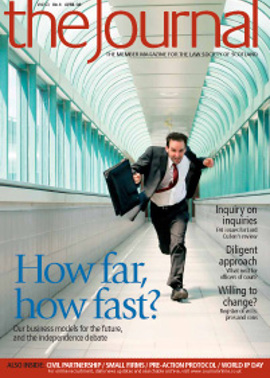Life at the sharp end

You thought the days of sheriff officers and messengers at arms were numbered? Not just yet, it appears.
Readers may recall that one objective of the Bankruptcy and Diligence etc (Scotland) Act 2007 was to re-style Scotland’s two bodies of officers of court as “judicial officers”, and bring them all under a new quango, the Scottish Civil Enforcement Commission. The move was controversial: the officers maintained that as impartial officers of the court, it was critical that they be appointed by, and remain answerable to, the judiciary. Now, however, the SNP administration, having apparently decided that its predecessor’s creation would be too costly to justify its existence regulating a profession only about 200 strong, is not to implement that part of the Act.
The decision, it would be fair to say, is one that has pleased the existing professional association, the Society of Messengers at Arms and Sheriff Officers (SMASO). Dorothy Lowe, its current President, remarks that SMASO, while preparing to work with the Commission, regarded it as a “sledgehammer to crack a nut”, not even having a proper remit: “There were suggestions as to what the Commission was going to do, but nobody ever really spelled out its role in clear terms.”
Questions remain for Lowe and her colleagues as to the way forward. SMASO itself, she asserts, is keen for the profession to modernise and has some fairly clear ideas as to how that should happen, but is less convinced that there is yet a replacement strategy at government level. For one thing the language of judicial officers permeates the whole of the 2007 Act, and there is no sign of any attempt to amend it. And such contact as the Society has since had with government suggests that it may be two or three years before further decisions are taken.
Pragmatic course
Top of SMASO’s own agenda is compulsory membership. At present it remains a voluntary organisation, albeit about 60% of the profession are members. Lowe believes it could achieve a lot more if all those holding a commission were required to join.
“The Society has a very robust code of business practice, and it takes this very seriously. If there were any issues of practice reported to the Society, whether it was a member or otherwise, it would take steps to make sure that the person or the firm concerned was communicated with and if necessary reported to the sheriff principal. But at the moment because we don’t have compulsory membership, we really have limited powers.” And it isn’t good for the profession’s image if complaints come in and the Society has to say it can’t deal with them because the sheriff officer concerned is not a member.
Currently operating on a “shoestring” annual budget of around £80,000, SMASO yet runs a full training and examination programme. This would have survived even under SCEC, and Lowe believes it could be self funding given full membership, perhaps with trainee or student membership on top. She claims a positive way forward could be put in place very quickly if SMASO’s commitment to standards were allied to an enhanced role for the Lord President’s Advisory Council on Messengers at Arms and Sheriff Officers, with which the Society already works closely both in fee reviews and as regards operational issues that arise.
“We want to be a modern profession, we want to move with the times, but we want it to be done in a pragmatic way, not just for the sake of if you like a bit of a political power drive. So we strongly recommended that going forward a body such as the Advisory Council would play an overarching role, perhaps with more responsibility, more powers, but certainly broadening the membership… We saw that perhaps it could represent us in terms of moving towards a much more transparent profession, that would involve public reporting, and we’ve embraced discussions along these lines; and we saw that without spending the amount of money that the quango was going to cost, we could do this on a self funding basis, provided we had compulsory membership.”
Don’t shoot the messenger
Although the 2007 Act, known unofficially as the BAD Act – Lowe insists this is purely an acronym! – intended to create a single class of judicial officer, the two halves of the profession seem content for the current division of functions to continue. This goes for sheriff officers as well as the messengers at arms who are, she says, very protective of their historic office.
“There is a whole width of experience for messengers. I’m not a messenger, I’m a sheriff officer and for me to go and serve instructions from the Court of Session, in effect I don’t have that experience and to pretend I had would be very wrong: there would be a major risk… We truly believe there needs to be a distinction, for no other reason than you need a much higher level of experience to serve the Court of Session.”
The limits of ABS
What the Society would like to see, which paradoxically would take its members in the opposite direction to that in which the solicitors’ profession is now heading, is more restrictive rules on ownership of firms. “I would say not all but the majority of our members believe that firms of sheriff officers ought to be owned and run by sheriff officer professionals. The reason being that we’re answerable to the sheriff principal, and if you’re not a messenger at arms or a sheriff officer the sheriff principal really has no power to enforce any matter.” Lowe does believe that even those firms with external ownership are coming to accept that there has to be some form of accountability, though working out a model is more difficult, especially with non-Scottish ownership – and where have we heard that sort of thing before?
“Don’t get me wrong, in my business we have accountants, IT managers, business development executives, we have a whole cross section of very valuable people. Possibly without them we wouldn’t have a business, and the profession recognise this, but what we’re saying is that when it comes to accountability, the majority shareholder is a sheriff officer and he’s accountable.”
But it seems rather odd that the governing Messengers at Arms and Sheriff Officers Rules of 1991 still prevent an officer of court from being a solicitor or an advocate, or a firm from incorporating – yet it is possible for a firm to be owned by a limited company.
Transparently obvious?
Through our interview Lowe keeps returning to the principles of transparency and accountability which she believes should govern her profession. One area where SMASO wants to see its members being able to operate more openly is as ordinary debt collectors. Under the 1991 Rules this requires the permission of the sheriff principal, subject to such conditions as he sees fit. In some cases the officer has had to set up a separate business, with separate notepaper, even if trading from the same premises.
“Why all this cloak and dagger stuff?” she asks. “I’m a sheriff officer and I should be proud of it. All of my actions are subject to the sheriff principal’s scrutiny, and if I collect debt surely I would be more regulated than Dorothy Lowe that’s sitting up a back close pretending not to be a sheriff officer. We’re trying to encourage transparency, so we feel very strongly that debt collection should become one of our official duties and should be regulated, and effectively come under the same supervisory and disciplinary powers, with the same recourse in case of malpractice as the sheriff officer business.”
Her profession still suffers, she believes, from a hangover of the public perceptions reinforced, if not created, during the days of the poll tax. “We were acting on behalf of local authority clients and we had no support, they just wanted to give us the warrants and get us out to do the job. We were happy to do that, we did it, and of course we got shot down for that, and it stuck if you like.” What government really wants, she adds, is consistency in the way her members operate. “We would like consistency in the way in which we operate. We would like clear, consistent guidelines, policy. The Society operates by a code of professional ethics, but unless you’re a member it means nothing.”
But she feels her profession has come a long way in being accepted by the likes of Money Advice and Citizens Advice: “They’re coming round to realise that it’s far better working as a team than against one another, because at the end of the day you’re trying to achieve the same objective.”
“We are professionals in our own right. We have a very difficult job: out there enforcing the orders of the court you’re never going to be everybody’s friend but people have to realise, the public have to realise, that we’re doing our job. And if we’re doing it in the best way we see fit, if we have a transparent, all-accountable code of professional ethics, a constitution that is supported by good disciplinary procedures, that’s the ideal. I don’t know how long it will take to achieve that.”
In this issue
- Thinking ahead
- A line too often crossed
- Big leap forward
- Independence: still viable?
- FAIs: a new lease of life
- ARTL: Turquoise is in the pink
- Summary trials: deciding the facts
- Life at the sharp end
- Conscience and public service
- Wills and ways
- Achieving "senior" rates?
- CPD: the way forward
- Life on the edge
- Pre-action protocol for industrial disease claims
- Fit a doin'?
- Same difference
- Curiosity corner
- System? What system?
- Reviewing appeals
- Testing insolvency
- Scottish Solicitors' Discipline Tribunal
- Website reviews
- Book reviews
- Day of creation
- Lawyer behind the camera
- Homing in on home reports






